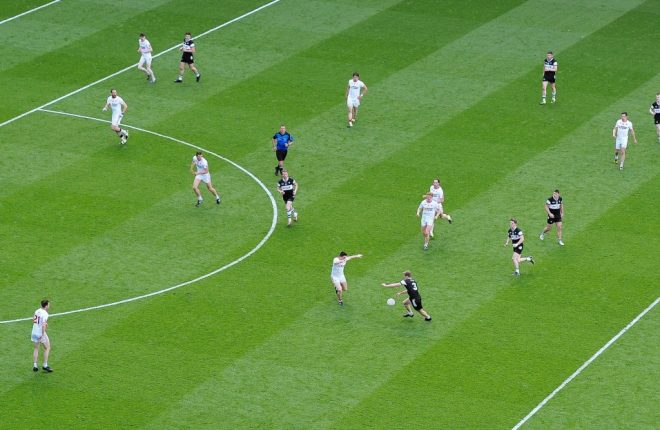
An aerial view of Tyrone’s system against Sligo
IT was very refreshing to witness the start of the Championship last weekend across a number of provinces and the return of the Sunday Game, which hopefully this year will provide a more in-depth analytical look at games and particular key tactical issues in the modern game such as match-ups, re-starts and, of course, systems of play.
A system of play is the one that causes the most debate around the country but I do still feel there is ignorance amongst many coaches about the importance and effectiveness of a good system of play, even at the highest level.
When we sit down this summer and watch football across our four provinces, we will come across many different types of systems of play that is a fact and also many teams who won’t have any system in place.
The questions will then be asked, are we too obsessed with systems? Is it stifling the natural skill/creativity of our games? Are they necessary, do they even work or do systems just stop the opposition playing? These are all questions that I’m sure would create huge debate.
In my opinion outside of Ulster (bar the big four) quite a few provinces are still very naïve in their approach, particularly in Leinster.
I know the debate rages on every time a team concedes a big score for a new tiered championship etc, but why not ask the questions, why are these teams allowing themselves to be so open and concede so many scores? On Sunday night watching the highlights on the Sunday Game infuriated me.
It was pretty evident in the Leinster games that no defensive systems were in place, there couldn’t have been, not with points tally’s in the 20s and multiple goals in every game, it’s simply impossible.
The reality is with every system of play there will be certain strengths/benefits and weaknesses. The challenge for us as coaches is to focus on our own team’s strength and try to exploit the weaknesses of the opposition.
You have to look at the players at your disposal and determine whether the players fit the system or do you adjust the system to fit the players you have.
Different systems can be used depending on whether team wishes to play a more attacking style of football or a more defensive style. Interestingly you look at any sport, it’s no coincidence the teams who are most successful are the ones who are organised and know their roles.
It’s a very simple philosophy in any team be it sport or business, for you to be successful there must be role clarity from the leader, coach or manager and role acceptance from the various team members.
A great example – in New Zealand a number of years ago they completed an experiment with a number of soccer teams which consisted of players between the ages of 11-13.
The experiment was pretty simple, and they were going to coach the teams in different ways with different coaching methods.
The results were remarkable, the teams that were just coached in technical drills alone and nothing else had quite a large number of shots on goal and made a large number of tackles which is to be expected, the team who were coached through small-sided games won more games than the team who were coached just through technical drills.
Most interestingly the two teams who were coached both above ways but also coached into a structured system of play, which included positioning and understanding of roles, contested the final.
Both finalists narrowly missed out on the largest number of shots on goal throughout the tournament but as a result of having systems of play in place they frequently out-numbered their opponent’s defenders and attackers in offensive and defensive areas, they conceded fewer goals than any other team and created more chances.
A number of years ago a similar study was completed on beach soccer. It showed the Brazilians were easily the most entertaining team but it was the Germans who were the most successful because even in a five-a- side beach football competition they were structured and organised.
It’s pretty simple coaches, if your happy with participation fine, but if you want to win, get a system in place.
Receive quality journalism wherever you are, on any device. Keep up to date from the comfort of your own home with a digital subscription.
Any time | Any place | Anywhere











